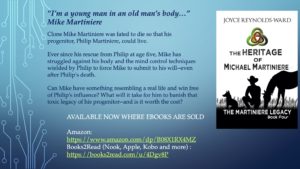While I’ve been working away on Gabe’s book, Michael’s book has been slowly going through the post-drafting process. I didn’t want to do the final touches on Mike until I finished with Gabe, just in case I came across issues from the past which could impact Heritage. As a result, I’ve not been talking enough about Mike.
Time to change that, especially now that Mike’s book is now out. So…some general thoughts about writing Mike as a clone.
********
One choice I made early on, after doing some research, was that I made Mike a reflection of the condition that his progenitor Philip was in at the time that his cells were taken. This is assuming that cloning of a full human would look rather like that of Dolly the Sheep, and that the clone would need to mature from infancy rather than be cultivated into an adult form. I also made the decision that Philip had ulterior motivations, including trying to integrate a digital clone of himself into one of his physical clones at some point. But Philip had a more pragmatic attitude toward his clones, viewing them as a source for blood and plasma to help him fight off cancer.
Essentially, Philip had dreams of immortality, both physical and virtual.
Mike was the thirteenth of thirteen cloning attempts, one of only four successful clones (which is also fairly realistic). Even with genetic screening and editing, he still carried a toxic physical legacy from Philip–arthritis, heart disease, and cancer. At one point, Mike gets access to his cloning records, at a fairly young age, to discover that even with intervention his lifespan will likely be short.
So Mike’s assorted health problems play a big role in The Heritage of Michael Martiniere. When we first see him as a five-year-old, he’s barely recovered from a blood draw that nearly killed him. And because Philip is old, mean, and narcissistic, he had little Michael subjected to chemotherapy before the blood draw in order to maximize his own treatments. Needless to say, five-year-old Mikey has health problems when Gabe and Ruby rescue him. He’s been raised in a laboratory and not exposed to the outside world at all. Even after his rescue he has immune system problems that means he gets sick a lot.
He has some huge psychological issues as well. Mikey doesn’t like doctors. He doesn’t like certain procedures–for good reason. But all the same, he has a good ten years or so before the health issues start showering down on him.
However, there’s always the specter of Philip hovering over him. How much like his progenitor will Mike turn out to be? Is he fated to become just like Philip? I lean pretty heavily onto the nurture side of the argument, but all the same, that’s an issue which haunts Mike–and his guardians–as he grows up. That doesn’t even get into the issues of Martiniere mind control manipulation and the existence of Philip as a digital clone just hanging around out there, seeking to fulfill his dreams of physical immortality.
(I have been thinking about digital thought clones for some time–that’s the foundation for the Netwalk books. When I saw some writeups on digital thought clones this winter as I was finishing Heritage, I realized that yep, that’s what I have been contemplating and anticipating.)
In any case, adding in the physical and psychological burden that a clone like Mike might have to deal with makes for an interesting story/thought experiment. Additionally, he’s being raised in a privileged family, because, to be honest, privileged, moneyed people are the only ones who will be able to afford the luxury of a clone like Mike. But it doesn’t make that process any simpler, or easier. And that was something I wanted to portray. Complete with the drama that is the obscenely rich and powerful Martiniere family.
***********
I didn’t think Mike’s book was going to be a big one. Maybe about 40,000 words or so. I hadn’t really planned it out but was writing it in self-contained segments as a break from intensive linear writing.
Boy, was I wrong. It became a full-sized novel.
And it’s out now in ebook.

